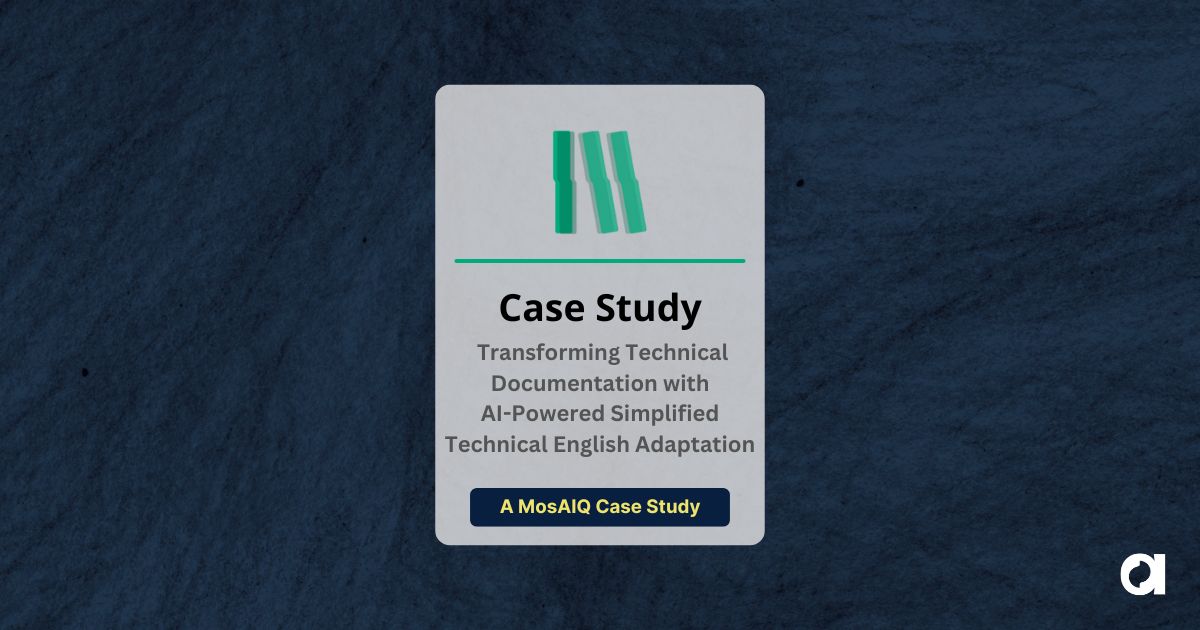Now that we explored ways to get started with AI, we should look at the risks of using it. As we plan to integrate tools that employ artificial intelligence (AI) into our work, two big questions inevitably arise, just as they usually do when a new technology emerges:
Is this safe? Should I be using it this way?
Offering the potential of efficiency and scalability, AI is causing some pretty big changes in the localization industry — along with a few new headaches. As with any transformative technology, its integration brings ethical considerations and security to the forefront. Understanding these implications not only enables trust but also helps manage potential threats.
To keep your organization safe, let’s take a closer look at some of the issues that can be overlooked in the rush to revolutionize.
Understanding Ethics in AI-Powered Localization
Why are ethics such a big deal when it comes to AI? Businesses are held to ethical standards like transparency, fairness, and accountability to build trust, ensure equitable treatment, and provide ways to address errors and bias.
When it comes to the use of AI in business, ethical AI is striving to apply similar principles. Transparent AI builds confidence by making processes understandable. Fairness enables AI to benefit all individuals equally, avoiding discriminatory outcomes. Accountability requires that AI systems and their developers be responsible for their actions, enhancing their reliability and integrity.
In our sector, these issues are significant because they directly affect our work; localization deals with diverse cultural contexts and sensitive content. Respecting cultural nuances and providing accurate translations are the right things to do. This maintains the content’s integrity, protects brand reputations, and boosts user satisfaction. These best practices help prevent the spread of misinformation, increase adherence to global data protection regulations, and foster inclusive and respectful communication.
When Bias Goes Awry in Localization
All AI systems learn from data, and if this data contains biases, the AI can replicate and even amplify them. This can lead to unfair or inaccurate outcomes, which are particularly problematic in localization where sensitivity to cultural and contextual differences matters.
For instance, weighting gender in AI might result in translations that reinforce stereotypes, such as associating certain professions with specific genders. For example, when AI translates professions like “doctor” and “nurse”, it often assumes that the doctor is a man and the nurse a woman.
Cultural misconceptions can cause AI to misinterpret or inaccurately translate culturally specific references or idioms, leading to misunderstandings or even offensive content. Racial prejudice might manifest in translations that reflect or perpetuate harmful stereotypes, impacting the quality and acceptability of localized content.
To mitigate these issues, it makes sense to monitor and adjust AI output. Human oversight makes sure that translations are accurate and culturally appropriate. Using diverse and representative training data helps reduce the risk of getting the wrong output. Specialized tools designed to detect and analyze impartialities can also provide systematic ways to address these challenges.
Ethical Standards in AI-Driven Localization
Building an ethical AI framework is essential for using AI the right way from the start, especially in localization. This should include key components such as transparent processes, fair treatment of all users, and accountability measures. For example, guidelines might mandate regular audits of AI decisions and require that AI outcomes be explainable to stakeholders. Involving a diverse group of stakeholders in the development process makes the framework consider multiple perspectives and addresses diverse viewpoints.
Ongoing Monitoring and Improvement
Continuous monitoring is the most effective way to maintain proper AI standards. Regularly evaluating AI models helps them stay compliant with ethical guidelines and adapt to new developments. Feedback loops are vital; by incorporating insights from users and stakeholders, AI models can be refined and improved. This ongoing process helps to identify and correct biases and other issues as they arise.
Training and Awareness
Educating staff about AI use is fundamental to fostering a culture of responsibility. Training programs should cover the principles guiding AI integration and practical steps for protecting these principles. Promoting a culture of ethics within the organization encourages employees to prioritize making moral and transparent decisions when it comes to their work, leading to more trustworthy and reliable AI systems.
By focusing on these areas, organizations can execute their AI-driven localization efforts confidently, building trust with users and stakeholders alike.
Security Concerns in AI-Driven Localization
Now that we’ve discussed ethical practices in AI, let’s consider some significant security worries that arise when integrating AI into our work:
Data Privacy Issues: Data privacy and security is a top concern in AI-driven localization. Data breaches and misuse of sensitive information can have severe consequences. Compromised customer data can erode trust and damage your brand’s reputation. Keeping data privacy protected is essential for maintaining the integrity of both the AI system and the content to be localized.
AI Hallucinations: AI hallucinations, where systems generate plausible but incorrect information, pose significant hazards. In localization, these errors can lead to mistranslations or culturally inappropriate content. For example, AI might produce a translation that seems accurate but contains factual inaccuracies or cultural insensitivities. Addressing these hallucinations requires robust validation processes to make sure that the output is both accurate and appropriate.
Compliance with Data Protection Regulations: Adhering to data protection regulations like GDPR and CCPA isn’t just a nice-to-have — it’s required by law. These laws set standards for data privacy and security, and violations can lead to hefty fines and legal issues. Regular audits and employee training are vital strategies for compliance. And with the new EU AI Act becoming law recently, organizations would do well to stay up to date with legal standards and protect sensitive information.
Laying Down the Law: Strategies for Risk Mitigation
As AI becomes more integral to localization processes, implementing operational risk mitigation strategies is critical. Here are a few ways to protect the productive use of AI in your localization projects.
Implementing Private Instances of LLMs
Private instances of large language models (LLMs) offer several advantages. Enhanced security is a primary benefit, as keeping data in a private environment reduces the potential for breaches and unauthorized access. Compliance with data protection laws, such as GDPR and CCPA, becomes more manageable when the LLMs are configured to meet specific regulatory requirements. Additionally, private LLMs can be tailored to meet the unique needs of your localization projects, enhancing accuracy and relevance.
Setting up a secure and private AI environment involves several steps. First, access to the LLMs should be restricted to authorized personnel only. Encryption of data, both at rest and in transit, protects sensitive information from potential threats. Regular updates and security patches are essential to maintain the integrity and security of the system.
Employing Robust Data Security
Data security is one of the biggest concerns in AI-driven localization. Encrypting sensitive data and utilizing secure storage solutions are fundamental to protect against unauthorized access. Employing multi-layered security protocols can further safeguard this information.
Regular security audits are a logical addition to identify and address potential vulnerabilities. These audits should be augmented by consistent updates to security systems and protocols to ensure your systems remain up to date against emerging threats.
Human Oversight and Validation
Despite the advanced capabilities of AI, people remain indispensable in the localization process. Human experts play a vital role in making sure that the accuracy and cultural relevance of AI-generated translations ring true by reviewing AI outputs, identifying errors, and aligning translations with the intended message.
Keeping people in the mix involves implementing rigorous quality checks where human reviewers assess AI-generated translations. This process helps to identify and correct any inaccuracies or cultural insensitivities that AI might miss. Establishing feedback loops, where humans provide insights and corrections, is also essential. These loops support continuous improvement of AI performance by allowing the system to learn, adapt, and produce better results over time.
By following these strategies and keeping up with developments in our industry, you can manage the risks of AI-driven localization while also smoothing the integration of AI into your work over time.
Embracing Transparency in AI Localization
Emerging trends in AI ethics are focused on increasing transparency and explainability. Advancements in AI transparency involve creating systems that provide clear insights into how AI decisions are made. This includes developing tools that allow users to understand the reasoning behind AI outputs, which can help to identify and mitigate biases.
There are also significant opportunities to advance ethical standards in AI. Collaborative initiatives can play a role by setting new benchmarks for what’s acceptable regarding AI practices or outputs in the industry. For instance, industry organizations can work together to develop standardized guidelines for appropriate AI use in localization, improving consistency and accountability across the board.
Standard-setting bodies can also help by creating clear and actionable guidelines. These guidelines can provide companies with a roadmap for implementing AI practices and help them stay ahead of potential dilemmas. By participating in these initiatives, companies can contribute to the broader effort to use AI more productively and cooperatively.
Join us next time to explore how Argos Multilingual and other language service providers are leveraging AI to revolutionize the localization industry. Building on real-life insights from our recent report on the state of AI in localization, we’ll examine how localization teams are assessing their AI readiness and advancing their capabilities.
 Argos Multilingual
6 min. read
Argos Multilingual
6 min. read
As part of our series on the European Accessibility Act (EAA), we’re taking a closer look at an overlooked aspect of the new regulations affecting desktop publishing (DTP). Under the new rules, accessibility goes beyond web content and mobile apps to now include digital documents such as PDFs, Word, PowerPoint, and Excel files available on […]

 Argos Multilingual
7 min. read
Argos Multilingual
7 min. read
The idea of using Artificial Intelligence (AI) to make your work easier is a promising idea but it takes preparation in order to get good results. Now that we understand a little more about how Large Language Models (LLMs) are trained and how they operate, as highlighted in this first blog in our AI series, […]











